When Morgan White found himself neck deep in the struggles involving the opening of the TORONTO UNDERGROUND CINEMA repertory theater in Toronto, he soon realized he couldn’t just be a passive observer. Already filming a behind-the-scenes mockumentary web-series, White switched his focus to the real life drama surrounding him and soon began traveling across North America to document the difficulties and triumphs of those who choose to project 35mm films to a sadly decreasing number of film fans. Featuring interviews with Kevin Smith, John Waters, Atom Egoyan and George Romero, the film comes at a turbulant time for lovers of cinema, as the debate between 35mm and digital continues to rage on.
Morgan was kind enough to take some time out from promoting the film to sit down with Daily Grindhouse for a frank discussion on repertory houses, the difficulties of reaching a niche audience and the pros and cons of 35mm film.
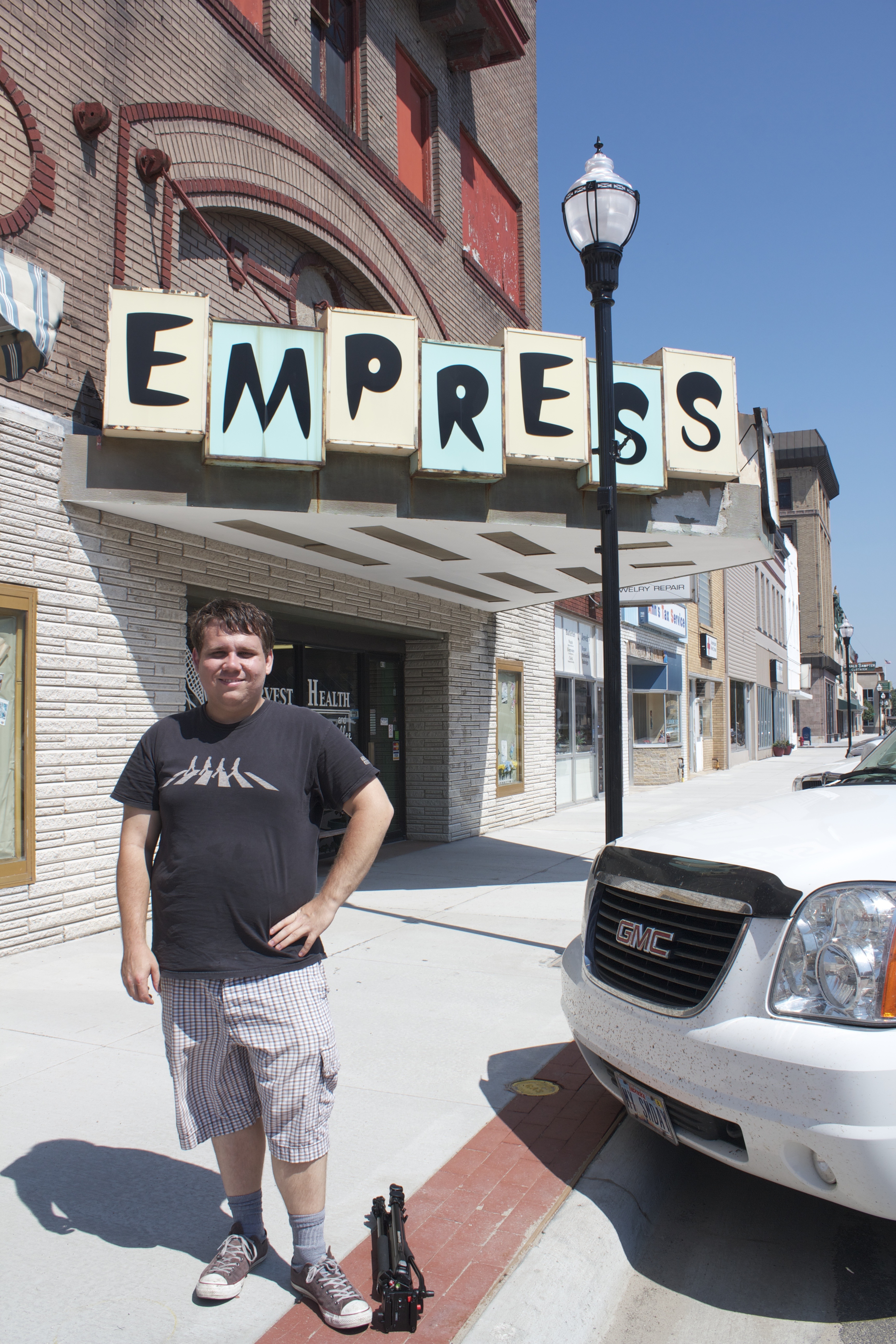
Sweetback: How did you initially get involved with repertory cinemas? Where did that interest evolve from, and how did you get involved with the Toronto Underground Cinema in particular?
Morgan White: It all stems back to college, basically. I lived in a small town. My parents are from just outside of Barrie, so obviously we don’t have a repertory cinema there. But I came to (Toronto) and I was in college and someone posted something about a screening at the Bloor, and I was like “what’s the Bloor?”. So I looked it up and thought.. Hey! This is kind of cool!
I think it was a screening of the director’s cut of LAND OF THE DEAD. I was like Oh! The director’s cut is playing, that’s really interesting. I kind of dug that movie when I saw it. It wasn’t the greatest thing, but maybe George fixed it or something. So I went and there was, like, three or four hundred zombie fans sitting in the audience and everyone was laughing and screaming at the kills. And then this really intense kill came on that wasn’t in the original cut – the one where the zombie pulls the the dude’s face right over his screaming skull – and everybody went apeshit. And I’d never experienced anything like that in my entire life.
So I just fell in love instantly. And I realized that I could go to a theater and experience something that was really, really cool. And that was like my beginning. And I fell in love with it.
And then I would go to screenings basically just at the Bloor. Because at that time the Bloor was the only place that had really good things going on. I wouldn’t venture out to the Fox, or even know about Ronsonville or anything. Sorry if I’m speaking very Toronto-specic.
Those are certainly ones I’m familiar with.
So I would go to the Bloor more and more often. They had the Edgar Wright festival and the Kevin Smith thing and these were things that Alex Woodside – who runs the Underground – was doing with the guys at the Bloor. So he had some hand in it. And I remember being at the Bloor one night for one of the Edgar Wright screenings, and I think it was the Bill Pope screening when they did ARMY OF DARKNESS and.. something else (editor’s note: TEAM AMERICA). Anyway, Alex came barrelling down the aisle. I had seen him before, and I don’t know if you’ve met Alex, but he stands out. He’s a big dude. He just came barreling down the aisle before the screening started. He ran to the back and back down the aisle. I had never seen the cinema staff before. I suddenly just noticed how this one dude was running for his life, and I couldn’t figure out why. It was probably to give Edgar something or turn the microphone off or something stupid like that, knowing now the circumstances of trying to run one of these screenings and how ridiculous all of the problems are.
And I turned to my friend and said “This is something that’s really interesting. What happens behind the scenes of a movie theater?”
So my friend and I decided to do this thing called THE REP. We did this one-off pilot thing at the The Bloor with Peter Kaplowski. It didn’t really pan out for many reasons. One was because they were changing staff at the Bloor, and the other was that the guys were going to be opening up this new theater. And Peter said I don’t really want to be a part of this, but my friends at the (Toronto Underground Cinema) might find this cool.
So I went and met with them – and I had never actually met with any of them before – and I just pitched them this idea. I want to do a web series about you guys running this theater. It’ll be fun. It’ll be goofy. And they were game. and that’s kind of how it all started.

Now, while THE REP looked at the behind the scenes of running a theater, it was also a mockumentary. Correct?
Yeah. Everything that happened in the web series actually happened, but we dick around and make the interviews a little bit different. We play around with the actual structure of how things happened. I don’t completely write the interviews, but some of the things that they say are just us coming up with them on the spot. Not actual answers to the questions.
How many episode of The Rep were there?
There were only five. And the reason for that is that I had this grand ambition that I was going to do one a month. And then I started filming. And I started realizing how long that takes.
And I also started to realize that there was this whole other story that was evolving. It was the true business of running a repertory cinema. And I was like: this is so much more interesting than these stupid little web shows that I’m putting together. These stupid little web shows are fine and fun, but I could never really get that deep, because I only had eight or ten minutes. So there was this whole other story that was evolving. All of the internal problems, and then the external problems. So I said you know what? I’m just going to keep filming. So I just kept filming.
Within a month of starting to shoot the web series I was like “Fuck it”. I’m making a doc. It was like this really simple decision. I didn’t overthink it. I didn’t really think it. I just did it. And then suddenly just realized hey, I’m making a feature length documentary.
So you get this burst of inspiration. You start filming them – since you’re obviously already filming them anyway. It evolves naturally. How did you go expand that idea to cover repertory cinemas as a whole?
That was just a conversation I had with Alex. I’m really great friends with the three of them. I don’t want it to seem like I’m singling him out. But I have discussions with Alex.

He was like “you should talk to other theaters” and I was like “I’m not going to be able to do that. Are you kidding me? Yeah.. I’m just going to fly to Austin and talk to these guys in Austin”.
And I started to wonder.. Could I? If I contacted someone at the Drafthouse, would they say yes? So I contacted someone at the Drafthouse, and they said yes. I wonder, if I contacted someone at the New Beverly, if they would say yes? So I did that, and someone at the New Beverly said yes. So if I’m going to do these two, I might as well go to other theaters. It would be ridiuclous to just do these two theaters. So I e-mailed Zack Carlson – one of the programmers at the Alamo Drafthouse – And I asked if there were any other theaters he could suggest? So he sends me a whole list of all of this contact info. And I contacted every one of them and they said yeah sure. So I was like OK! I guess I’m going on a trip!
Everything about this project has always been.. I wonder if I could do that? Oh! I can?! Ok! I guess I’ll do that. (laughs)
It’s not like I sat there for two weeks and thought how am I going to go about this. It just kind of happened. Then on top of that, there was all the celebrities. Some of them were because of connections through the Underground, while others were like; I wonder what would happen if I contacted this person?
You began by interviewing these people that you were comfortable with, but it’s a whole different story when you’re interviewing people you admire; who you’ve grown up with and respect. Was that something you were hesistant to do, and was it intimidating when you were dealing with them?
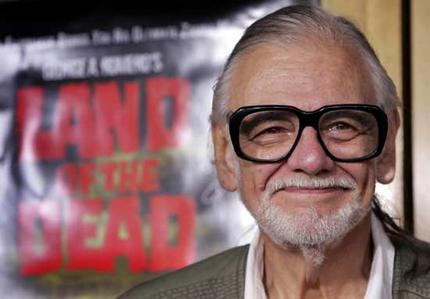
The concept of contacting somebody is definitely intimidating. So, take Romero for example. I love George Romero. I adore his zombie films, I love his shitty horror films. I’m sorry, I know that sounds really mean. He doesn’t make the best movies in the world, but there’s something that’s really awesome about him.
I was really nervous to contact him, and I was at this party and he was there. And I kept telling my friend “I’m going to go up and talk to him”. And he said I should do it. He kept pestering me and saying “go talk to him”. So I went up to him and shook his hand and I said we’re doing this project, would you be interested in it. And he said sure, give me your card.
So I figured, yeah fine. I’ll give him my card, but he’ll never call me back.
I was at work the next day – 10 AM. I don’t know why I remember so specifically, but I do. I was in a meeting and I look at my phone and because he has ID it comes up George A. Romero. And I was like “WHAT THE FUCK?!”. So I was in this meeting and said “Look. I’m going to have to leave for a second”. I go out and lo-and-behold it’s George Romero, so I had a discussion with him. And then it took six months to actually get to do the interview..
But.. then he’s like “just come over to my house”. I was like… are you kidding me? You want little old me who loves your movies to come to your house and interview you? Ok! Sure! (laughs)
So I did, and I was really nervous. But the funny thing is that the intimidation thing completely disappears as soon as I turn the camera on. I’m all fumbly and weird when I’m setting everything up and trying to make small talk – because I’m not a small talk person – but as soon as I turn the camera on I have this really strong intent; I know exactly what I’m doing and why I’m there. So I just do it. And it’s never been a problem for me.
And I’m sure that you know – doing interviews yourself – what’s the thing that people like to talk about the most? Themselves. As shitty as that sounds, it’s the truth. So, you right now are asking me questions and I’m completely content talking to you about that, because I’m talking about what I did. And I’m telling you all these different things. It’s that egotistical part of us. Obviously these people in that situation are just talking about what they want to talk about. What they love. So there’s nothing to be intimidated by.
Going back to the idea that you said earlier. About contacting these different REP cinemas. Having people who said “Yeah. Come on down. Let’s do this”. How did you actually go about funding the documentary?
I had a really tense meeting with the person who runs my company. And I said: “I’m doing this thing. This little web-series thats become something bigger. I want to go on a two week trip, but I can’t afford it”.
And then she just gave me the money.
Woooooow.
It sounds ridiculous. And I try not to tell too many people. Even though I just told the entire world. That was another thing that wasn’t as complicated as I thought. Around my office it’s kind of my thing… I talk about it a lot because I’ve been obsessing about it for a long time. And I think with that passion, it stems out, so people are willing to help. And I think that’s what it kind of was. This is obviously something that is very important to (me), so we’ll throw you a bone. And we’ll let you go and do this crazy thing.
But I will tell you that the percentage that what the gave me is miniscule compared to the percentage that is my own money. (laughs) I’m very poor right now. More poor than I’ve ever been in my entire life.
BUT.. you get to tell people you’re Morgan White – FILMMAKER. That has some intrinsic value, I think.
It does. I hate the sound of that, though. I don’t know why.
Morgan White. Documentary filmmaker. With a feature just about to be birthed into the world. Featuring Kevin Smith and John Waters and George Romero. That has to be overwhelmingly exciting.
It is. It is. I don’t want to sound like I’m not thankful for all of this. Or that I’m not excited about it. But I’m also… I’m really terrified. I’ve been living this thing for so long. I know it’s good.. or at least in my head I know it’s good. But I don’t know what it’s going to be like when it’s out there.
Jumping back to something that is hopefully a little less scary. You’ve talked to representatives of some of the most well known rep theaters. Is there an element after talking to them – especially since you spent so much time with the folks at the Toronto Underground Cinema – Is there an element that connects these people together? Is there something in common that makes them want to do this?
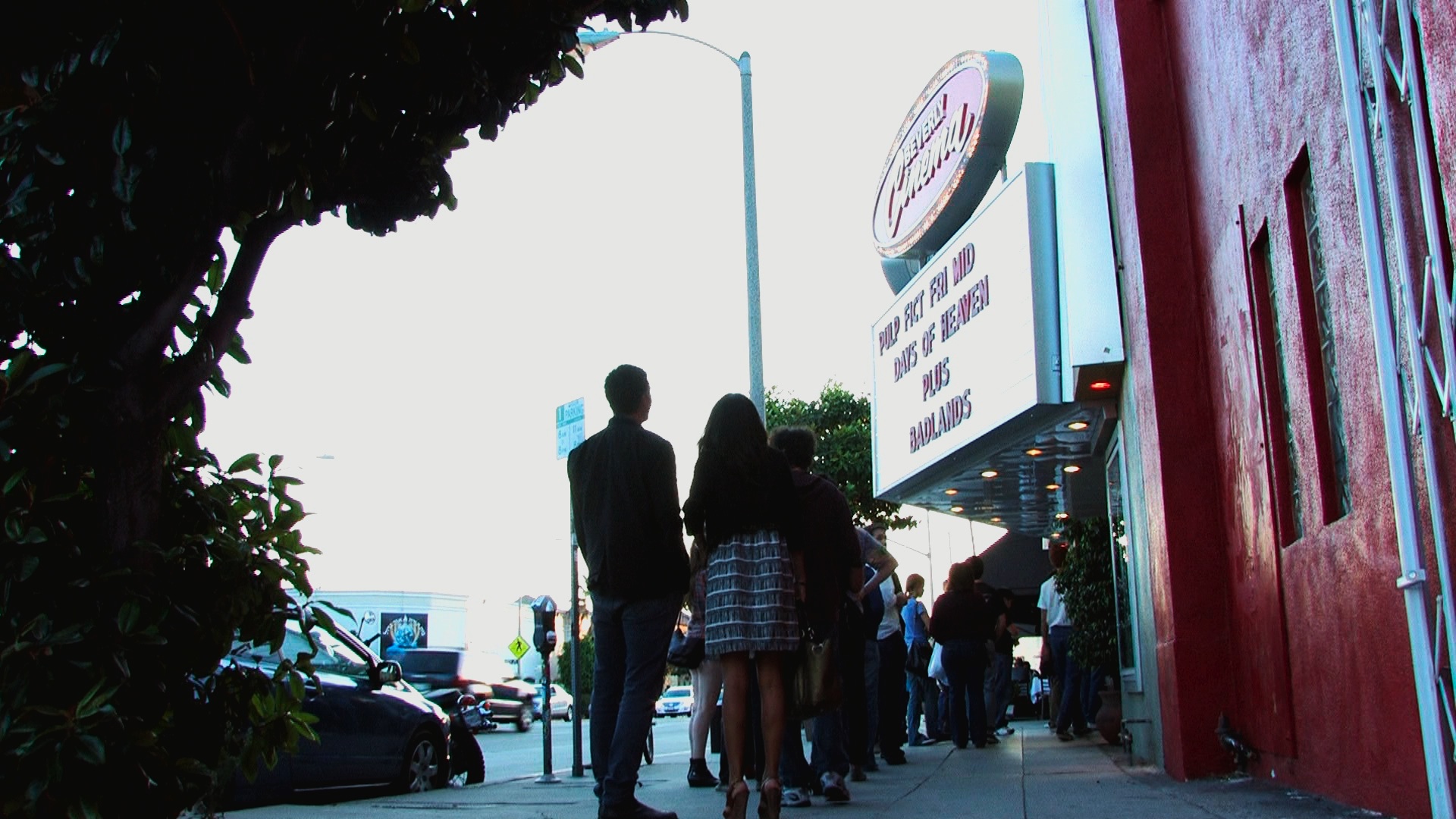
Passion. That’s the only thing I can think of. You don’t do this for money. I can tell you that. That’s something I heard from every single person. Even eveyone at the Alamo. They do it because they love it. It just so happened that the Alamo worked really, really well. And they’re thankful for that. But you don’t make a boatload of money doing this thing, and it’s a lot of work. So you better be god-damn in love with it. Or else you’re going to crumble at its feet. And that’s the thing that I realized. Everybody loves this so much. They care about movies so much. So that was really cool for me, because that passion that I feel was there with everyone that I was talking to. Everyone just loves this so much.
How awesome is it to pick a film that you really care about and string it up for a bunch of people. And hope to God that they like it too. That’s a really cool thing. So, yeah. It’s complete passion.
I’ve always felt that, compared to most different fandoms that can be really insular, really passionate cinephiles are all about inclusion. It’s all about “I love this so much, I want you to see it too. I want to show you. I want to bring you into this cult of enjoying this thing”. And I think you see that again and again with these rep cinemas. You get these people who so excited about something that the financial aspect is secondary to just getting that exposure for something that they love.
That’s definitely it. Think about how the repertory cinema functions. You go to a multiplex, what’s the first thing they want you to do when the movie is done?
Leave!
Get out. Get out as soon as you possibly can. We have another bunch of people coming in to see this same scholock, and then we’ll kick them out. In a repertory cinema, they want you to stand in the foyer and talk. They want you to discuss the film. Because it’s a place for cinephiles to exist.
It’s the same thing for independent video stores and all that kind of stuff. There’s something about cinephilia that requires you to talk about it. You don’t talk about paintings the same way. You don’t talk about books the same way. The moving image is something you talk about that way. So all of these people are standing in this lobby of a repertory cinema. They are there to talk about it. And the people who run the repertory cinema are there to talk about it with you. And it’s this sharing thing. Repertory cinema is all about sharing. And cinema should be about sharing.
Now you mentioned that screening of LAND OF THE DEAD. That was your first experience with a rep cinema in Toronto. What is your most memorable rep cinema experience at this point?
That’s tough. But it’s going to go down in history as being one of my favorite screenings. Last weekend at the Underground they did Cinema Apocalypse. The Vagrancy screening. I don’t know if you heard what happened. They played DESTROYER – which is a terrible, terrible film. I mean, holy shit. But I’ll never be able to watch it again, because one of the Vagrancy guys mixed the reels up, so the whole film played out of order. So it played Reel 1, then reel 3, then reel 2, then reel 5 with the credits and then reel 4. And it was one of the greatest things I’ve experienced in my whole life.
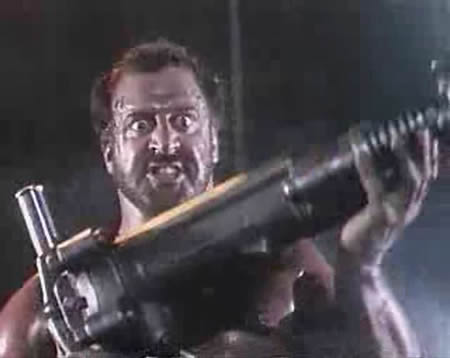
That’s a pure cinematic experience right there.
You can’t get that at a multiplex. There’s no god-damn way in hell. Unlses the video file was fucked up. And I love that. That is pure.. awesome. Because it just happened that way. And it was a mistake, but it was a mistake that made the screening so much better. And that’s the really cool thing about 35. You never know what’s going to happen. And that’s kind of cool.
That’s a perfect transition to move onto it. 35mm is the hot topic of the moment for cinephiles. It’s dying. People are very passionate about it. There’s been this groundswell of people with very strong feelings about it. Obviously Julia at the New Beverly is trying to put that documentary together. What do you see as the pros and cons of 35mm?
It’s funny. I just prefer it. I don’t know what the pros and the cons are. Obviously there are cons in that they get scratchy and the film breaks and there’s this analogue aspect to it. But all of those cons are also pros to me. It’s like the vinyl record thing. It sounds better to me even with the clicks and pops, because the clicks and pops are real. They are something that happened. And that’s the beauty of 35. 35 was the way that everyone experienced that film, and every time it ran through that projector, it kind of captured something.
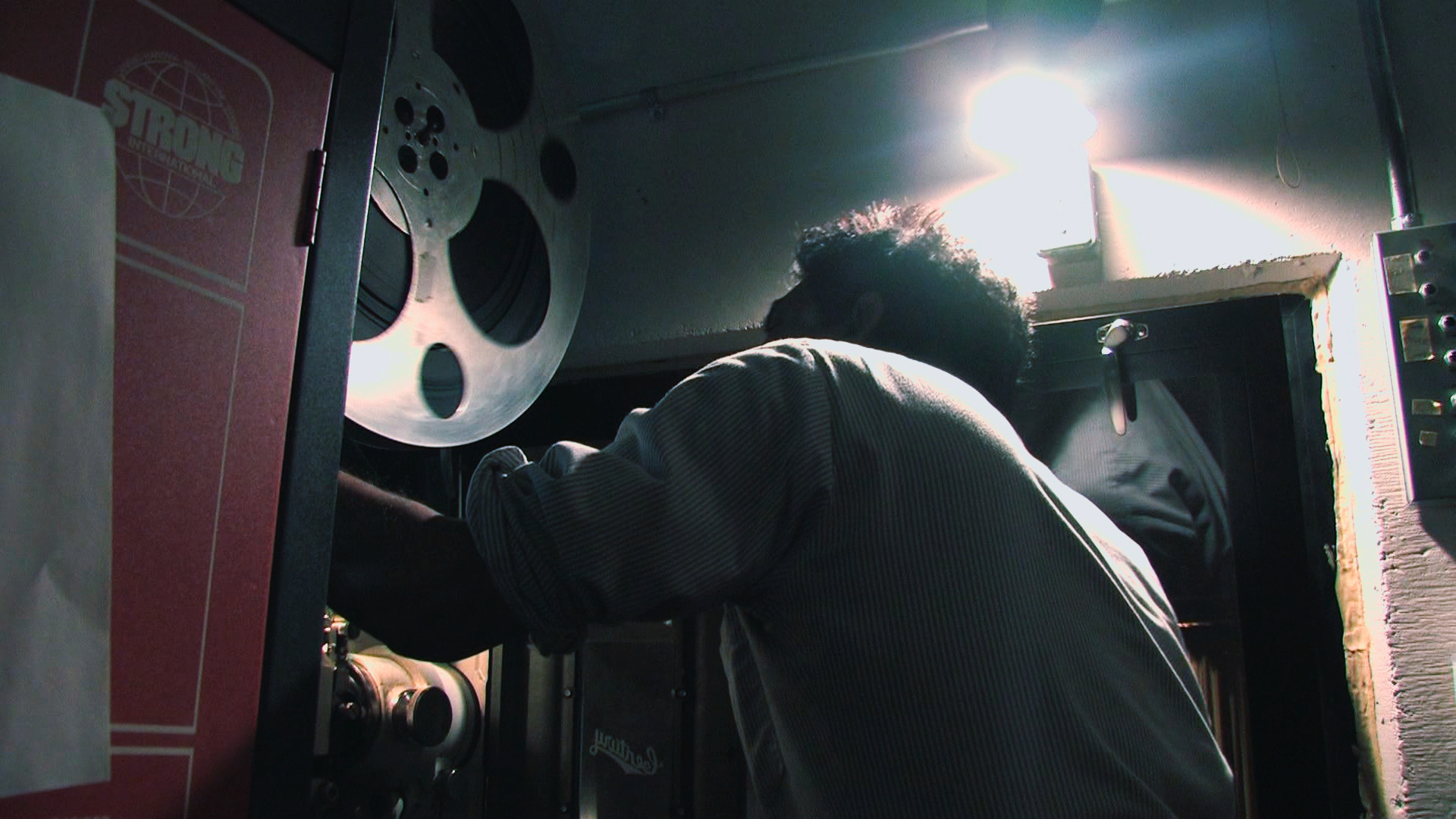
And whether you noticed that or feel that is besides the point. It captures something of that screening. Because the projectionist could have screwed something up, or not. There could have been some slight problem with the projector that caused certain frames to get a little stepped up or whatever. With each screening that film print takes another life of itself. I think that’s a beautiful thought. And it’s the same thing with records. That time that you listen to that record is the only time that it’ll sound exactly like that.
I remember a couple of years ago I was attending one of the SHOCK AND AWE all night Grindhouse movie festivals that Dion Conflict puts on in Toronto. And I think it was during RED SCORPION – the Dolph Lundgren movie.. The film burned in the projector. It couldn’t have been a more perfect burn on the screen. I remember thinking.. this is the last generation that is going to be seeing something like that happen.
It’s true. And also.. that’s the last time on that print that anyone will ever see that frame burn. It’s true that no-one’s ever going to experience the film like that again. That’s really, really cool. And that’s what I love.
People think that that’s a con. But I think that’s a pro. There’s also something very life-like about film, right? Film is chemicals. It’s things brought together in an analogue, chemical form. Digital is numbers. Digital is cold and perfect. Film is warm and changing. They’re not the same thing. And you can’t really argue for one or the other. But you also can’t trash one over the other. I like going to a 35mm screening of an old film, because that’s the way I think is the way that should be seen.
But there’s still nothing wrong with a digital presentation of that film. It’s still the film. It just isn’t the exact same.
But I don’t know why. And I don’t think anyone really knows why. Because I think it’s a perssonal feeling that you get. You just know it or you don’t know it.
There’s a fairly famous incident where Christopher Nolan got a crowd of film-makers together and pleaded the case for 35mm and suggested that something had to be done. Do you feel this is the end of an era? Do you think it’s tragic that we’re losing this?
Yes I do. And I do from a historical perspective. It’s something that we’ve been using for a hundred years. And to just cast it aside is completely the wrong thing to do. And we are at an end of an era. Digital is a wonderful thing. But film is also a wonderful thing. And to understand that is a really valuable concept to have. I’m saddened by it. I want to be able to shoot on film. I want to be able to project on film. The fact that studos are completely ignoring the theaters that are not going to be able to go to digital and are saying “whoa. We’re going digital. Fuck you guys”. That’s like the worst thing they could be doing. They’re eliminating this whole world of cool. That sounds stupid, but it’s the way that I see it. These places are cool, and they play 35 because they love 35. And there’s something really cool about 35. And they believe in 35. And they believe in all of these things that they believe in, and they’re passionate about them. And that’s what I think is really sad. There’s not going to be these same passionate places.
I can’t believe I’m saying this, though. I haven’t had much time to think about it, so this is knd of just coming out. I really truly believe that film needs to stay. I buy prints. I’m a collector now. And I want to be able to project films on film, because I want to see them that way. I don’t want there to be just a digital way of seeing films.
I think there’s nothing more revealing than when you said what you’re really losing is a sense of cool. That’s not funny. That’s not something that sounds stupid to me. To me, that’s a core element of what we’re talking about. It isn’t about being exclusive, or that only certain peopole can experience this. It’s that this is physical and real life, and it brings people together. Film-making is a collaborative medium, and it should be shown in a collaborative forum. I think losing that is tragic. We’re becoming these individuals while we’re sitting down watching a flm, and then we’re heading out and we’re just separating and there’s no follow-up. People have to love that theater. They need to love the place that they’re going to. And I think that’s what I worry about more than anything else. That the individual cinemas are losing their luster. Losing their meaning. That’s really depressing to think about.
They’ve lost their meaning. That’s the really sad thing. To the general populace, theaters as a whole don’t matter. You don’t need to go to a cinema to see a movie. We’ve been told that for years. We’re 80s kids, and in the 80s we had VHS. I did not see most things in a theater, I saw most things in my parent’s basement or the living room on a VCR. Did I lose something from watching that way? I don’t know.. Because when I think back on it, I fucking loved those movies.
Here’s a really great example. HONEY I SHRUNK THE KIDS is one of my favorite films of all time. I know it’s a terrible movie, but I love the hell out of it. Because I remember when I was a kid sitting in my living room eating a bowl of cereal at like 6 AM having woke up and watching it a second time after watching it the night before. Having rented it out on VHS. There’s a really cool history for it for me. And then I bought a print of it. Because I wanted to see what it was like to watch this on the big screen. And we watched it on the big screen. And it was amazing. Oh my God was it amazing.
But, did that change the experience that I had when I was a kid? Does it kill the experience I had when I was a kid? Does it make it less? No it doesn’t. It connected me to the past. That’s what it is. It’s this direct connection to the past. In the trailer for the doc Kevin Smith says something along the lines of it being like a gateway to the past. A flux capicitor. It is! That’s exactly what it is. For certain people, a rep cinema is lke this beautiful, nostalgic place. But for an average viewer, it’s nothing. Because the cinematic experience doesn’t mean shit to them. It doesn’t mean anything to the large population because we’ve had home video for so long now that it’s just a common place thing.
There’s no real way to change that thought process, because the studios have made it so acceissble to get films for so long that the theatrical experience has just been devalued. It’s irrelevant. But then there are people who really believe in it. And I don’t believe it’s irrelevant. And I don’t think anyone should ever feel that way. Because it’s not. It’s this wonderful thing that connects you to that moment in time. Particularly a repertory cinema.
Seeing a new movie in the theater, you will remember that. You will always remember going to a theater to see a movie. You don’t always remember sitting at home watching things. Now especially… I watch so many movies at home that I forget them. I’m like… where did I see that?
But I pretty much remember every movie I’ve seen in a theater. So I’ll see a trailer for something and I’ll be like “Oh my God. I saw that when I was 12 in the theater. I totally remember that”. And that’s a really cool thing. So I think the theatrical experience brings forward this extra level. This really deep meaning, I guess. I don’t know. But I think it resonates differently with you. And a repertory cinema is like tenfold that, because it’s this nostalgic portal into the past. That you can go back and connect with something that you’ve had as a child.
I can go and watch MASTERS OF THE UNIVERSE on 35 now at 27 years old, and go “holy shit. I’m thinking about when I was 10, playing with my HE-MAN toys.” And that’s really cool!
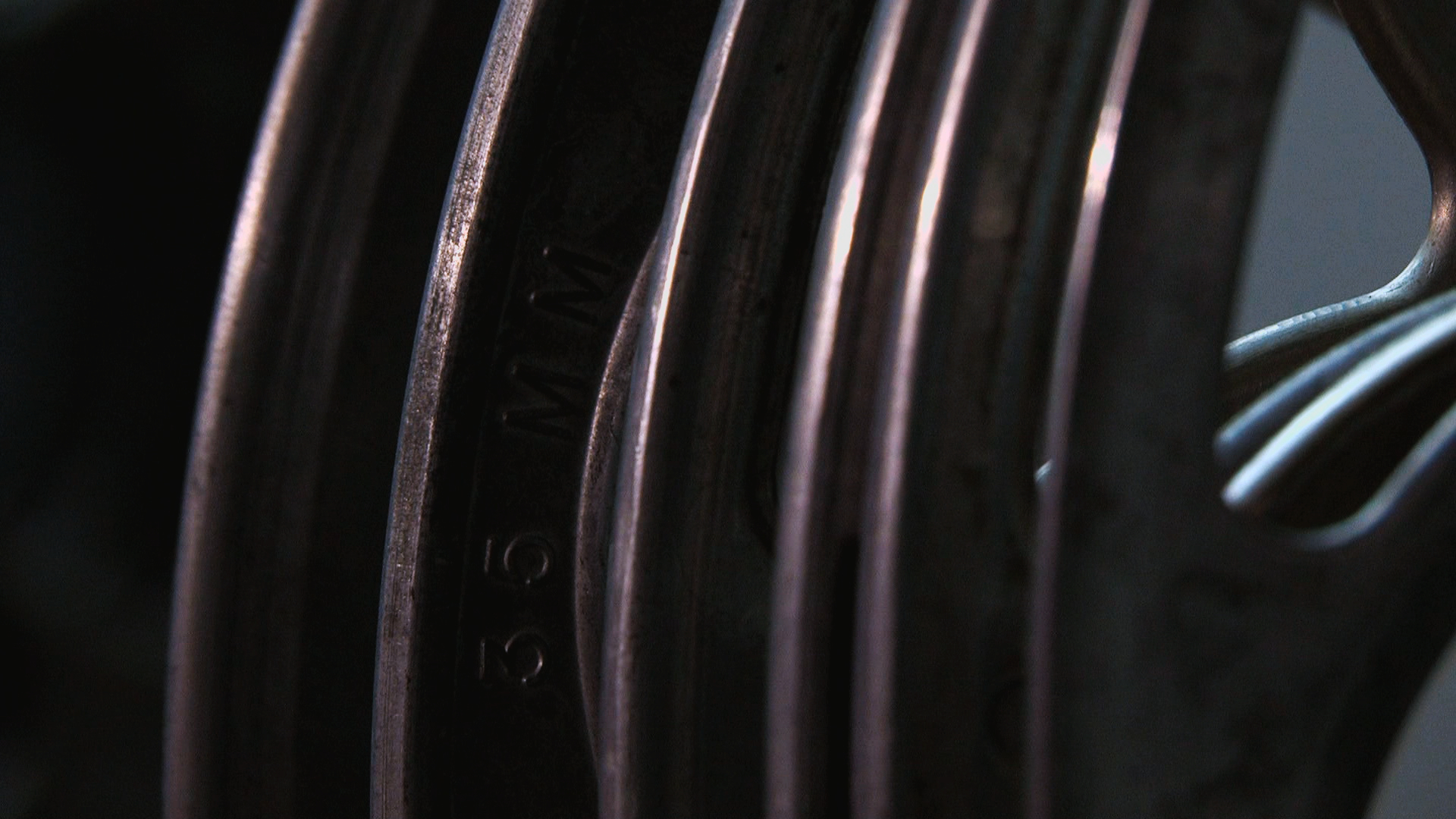
It’s amazing, because we both had that exact same experience. I saw that on 35 mm at that screening, and that’s it. You talk about that portal. That was a theater filled with people all having this same nostalgic experience at once. At the risk of sounding silly, I think in my own life experience that I’ve had more of what I would call a spiritual experience in a cinema than I’ve ever had in a church or place of worship.
It’s interesting. The cinema is like the church of film. That’s what it is. A repertory cinema is like a church for cinephiles. That’s a really interesting way of looking at it. You’re going to pray to cinema. You’re goiong to sit and you’re goign to watch these movies in a really cool way. And really focus on them and love them with a group of people like you would go to pray in a church.
From what I hear. *laughs*
Do you think that that’s a part of it, then. That we’re losing this more tangible, physical part of this almost spirital experience. The fact that digital feels more cold and distant, that we’re actually losing this spiritual – spiritual in a loose sense – experience?
Yeah. I think we’re starting to lose this. That’s a weird thing to get into. Because you’re getting into a completely obscure way of looking at that. You really lose this tangible quality when you switch to digital. One of the guys that I interviewed was Ross Melnick who is a theater historian, and he had this really interesting point where he basically said there’s something that (we) don’t realize, but is really important. And that is when there’s a projectionist projecting a film, he is there to present *you* the film. So there is somebody there playng the film for you. And showing it to you. And there’s a really connectable thing to that. With digital there’s a machine that’s playing it and there’s a dude that pushes a button. I’ve talked to projectionists about how things operate for digital. You go and you push a button and that’s it. And actually the systems are timed, so if the projectionists miss the movie ending the system will cue the lights to turn off. So there’s nothing to it. There’s no thought process. It’s just here’s the movie.
I could do that at home. It’s the same thing as pushing a button at home on Netflix and watching the movie.
In a theatrical 35mm exprience, you are being presented a film and there’s a projectionist who’s trying really hard to present that to you in the best possible way. And if it fucks up, it fucks up. He or she didn’t want that to happen. It just happened. They’re there to make sure you have the best possible experience. That’s something that’s terrible to lose.
Projectionists. We’re losing them. That’s terrible. These people who spent their entire lives perfecting their craft – and it’s a craft. I know how to thread a projector. It’s fucking complicated. It’s a scary pain in the ass. And people spend their lives perfecting that. And perfecting setting up a print.
You have to build a print. That’s really cool. You have to build the movie. You actually have to put the film together to present it. So you’re taking the time and care to put this thing together to present it to people. With a digital file, you’re slapping a hard drive in a bay and then boop. Done. There’s the fucking movie. Enjoy.
I hate that. The more and more I think about it, I actually really hate that. It bothers the fuck out of me.
At the risk of getting more pessimistic, where do you see reps like the Toronto Underground Cinema or New Beverly or the Alamo Drafthouse in, say, ten years?
Why did you ask me that question? You asshole. *laughs* Well, the drafthouse is fine. That’s not going anywhere. But they’re subsidized with other things. By food and first run films. They’re rep, but not a true rep.
You know it’s funny. I want to say that they’ll all be around. And that every cinema is going to make it. And that they’ll all stay open and be really optimistic. But the fact of the matter is that most of them are going to close. And that’s just the sad reality of the situation. In ten years, who knows how we’re going to be experiencing films?
I think the multiplexes are also in a lot of danger. In fact, there’s a thought process that VOD will kill off thousands and thousands of theaters.. All of these different innovations of distribution methods are going to hurt cinemas. They’re going to affect repertory cinemas, first run theaters, independent theaters. It’s going to effect everyone. I think a lot of place are just going to disappear. And that’s really really sad to me. And I don’t think there’s anything that can be done about it.
You can raise awareness, but awareness can only go to a certain point. Theaters get torn down all the time. Theaters get converted all the time. You walk around your home town, you will find a theater. I guarantee it. Every tiny town has a theater, and then the multiplex came in. And eveyone went to the multiplex, and that little theater died. And now those theaters are potentially going to die. And that’s just the way that it goes.
Are most of these reps switching to digital? Or is that something that most rep cinemas simply can’t afford to do?
Surprisingly, most of the theaters that I visited have some form of digital. But not DCP (Digital Cinema Package). The film forum in New York has DCP. The Alamo Drafthouse definitely has DCP. The New Beverly is only 35, and obviously their thing is “we’re not switching”. Which I think is awesome. There’s that whole video of Quentin saying that he’ll burn the fucker down before he switches to digital or something. That’s awesome to me. The passion behind that is amazing.
How about the Underground?
The Underground? If things continue the way they they’re conintuing, there’s no way in hell they’ll be able to afford it. I hate saying it, but it’s true.
It’s too god damn expensive. It’s $150,000. They’re looking at it, and they want to switch if they can. They want to make it an option.
There’s a lot of theaters, especially multiplexes that are just casting aside their 35 projectors. You know how the Cumberland (Cinema) closed? You know what they did with the projectors? They threw them out a window. They’re gone. Why? That’s perfectly good equipment. That’s equipment that could be used somewhere. You could use that in concert with a digital set-up.
The lightbox has it. The lightbox is 35, 70.. 16 as well. That’s great. You can have a DCP in there, too. And I think that’s what a lot of these theaters will have to do. Have both. And they’ll play 35 when they can. The Hollywood theater in Portland. They have digital screenings, but Dan – who’s the programmer – will stand true and play as much 35 as he possibly can. So much so that he bought up a ton of 35 projectors, and has this storage dump in the back that he just showed me through some pictures. And I was like “why didn’t you have this when I was there”? I really wish he had that while I was there. That would have been some great B-roll.
It’s funny. If the theater can afford it, then they will and they should. They should switch to digital, or at least have the option of digital. So they have the option to play certain films. But to cast aside 35 is the wrong way to go. Maybe in a multiplex situation it’s fine, because if you’re only play first run films they’ll only be available that way. But I don’t know. I don’t know if the Underground can afford it. They’re going to try, and I know that a lot of theaters are going to try. And I hope that they do. And I hope that as many of these theaters can actually weather the storm.
The thought process is that 1000 theaters are going to close. 1000 theaters don’t actually need to close. 1000 theaters just need help to switch to digital. And that’s really all it is. That would be a wonderful thing.. if we could figure a way to subsidize all these theaters. You know the studios are subsidizing the multiplexes, and they could subsidize the independents too. But they won’t for some reason. I don’t know why, though. I never thought to ask that, to be honest, while making the film. I never thought to get a studio perspective. Probably because I would have been so god-damn angry with the answers, it would turn into a real shitty interview.
There’s gotta be a way to fix this problem. Because really right now the biggest thing isn’t the lack of patronage. There is a problem with patronage, but there will always be a problem with patronage, and there always has been a problem with patronage. But right now with this technological problem, it’s something that could be solved quite easily. And maybe it would take all of these theaters getting together and creating a group plan to buy all these projectors to sustain them for a while. But then what happens in ten years? What happens when the technology changes again and everyone needs to go 4K or 8K or 32K or whatever. Everything’s changing. And digitial changes constantly.
SB: You said at the beginning of the interview that the biggest problem with rep cinemas is that the audience their aiming for – the cinephiles – are a very specific kind of audience. Do you worry that your documentary is aiming for that specific audience, but it might not be able to go beyond that. Is it meant to be a wake-up call to people?
*pauses* Yes. *laughs* To both of those. Yes I’m worried that I made a film that’s too niche. In fact, I’ve always worried about that fact. There’s also a part of me that doesn’t really care. Because I know the larger market isn’t going to watch this film, and that’s fine. I made it for people like me, who don’t realize exactly what’s going on. And I think that that’s what I’m going for. It is a wake-up call to cinepfiles. It’s a wake-up call to those few thousand people who still really do give a shit about this stuff. And if it’s gone, they’ll be like “what the fuck happened to all the rep cinemas?” And I don’t want that to happen.
SB: You covered it to the best of your ability. I’m incredibly excited to see THE REP. I hope you know that, because I try to say it whenever I possibly can.
I know you are, I just hope there are enough people like you out there.
This is the big question. It’s all been heading up to this one major question. The big question is when are we going to get to see it? More importantly, when do *I* get to see it?
The thing is, I want you to see it right now. It’s not a question of that. I just don’t know how to get it out there. I’m trying to figure out the best possible way to get it out there. If it comes down in the end that I have to self distribute and contact theaters on my own, of which there are lots of theaters who want to screen it – I’ve had booking requests, which is really cool – then I’ll do that. But I want to try and make it the biggest possible thing it can be. Not for my own gain. Because I don’t care about that. I care about people seeing this so they can think about the situation, and hopefully it’ll change a few people’s perceptions.
That’s really my goal. I want to see people care, and I want to see people go to theaters and support them before they’re gone.
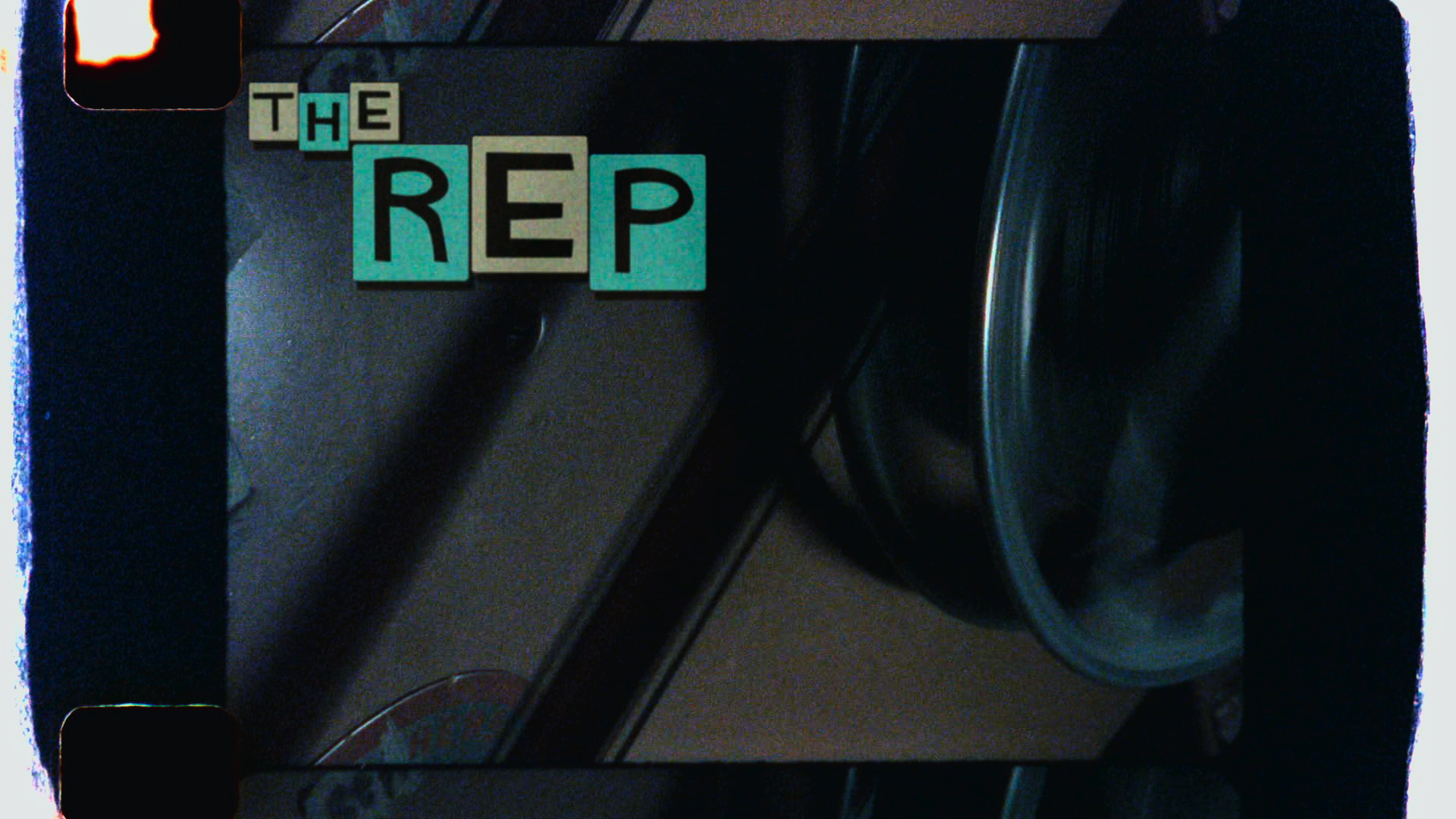
SPECIAL FEATURES:
THE REP – Website
Follow THE REP on Twitter
Sweetback
- [THE BIG QUESTION] WHAT’S YOUR FAVORITE FEMALE ENSEMBLE IN MOVIES? - July 22, 2016
- [IN THEATERS NOW] THE BOY (2016) - January 24, 2016
- Cult Movie Mania Releases Lucio Fulci Limited Edition VHS Sets - January 5, 2016





No Comments